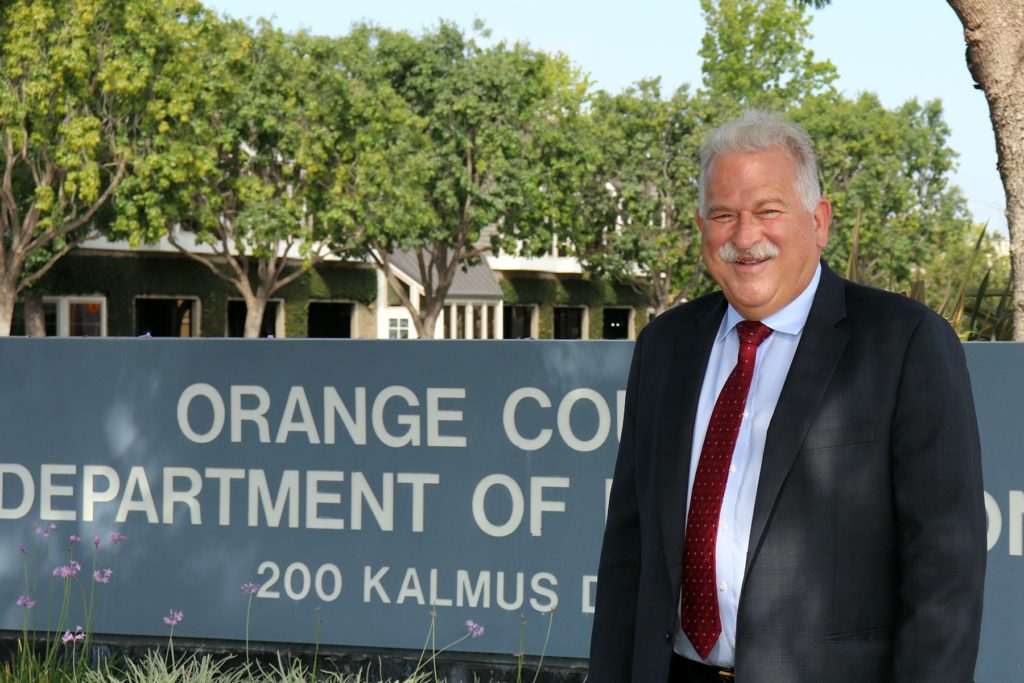For more than 35 years, Ron Wenkart has been the go-to legal expert for local schools and districts, but his reputation extends far beyond Orange County.
 As OCDE’s general counsel — a position he’s held since 1984 — he has long been considered among California’s sharpest minds on education law. Not only is he regularly consulted by educational leaders throughout the state, he’s also penned articles, taught classes as an adjunct professor, made numerous presentations and participated in significant legislative efforts, including seeking additional federal funding for special education.
As OCDE’s general counsel — a position he’s held since 1984 — he has long been considered among California’s sharpest minds on education law. Not only is he regularly consulted by educational leaders throughout the state, he’s also penned articles, taught classes as an adjunct professor, made numerous presentations and participated in significant legislative efforts, including seeking additional federal funding for special education.
Yet let the record show that, earlier this year, Wenkart announced his retirement from public education. His last day is July 31.
We recently sat down with OCDE’s renowned legal eagle to talk about his distinguished career, his biggest challenges as general counsel and what he’ll miss most about the place he’s worked for the better part of four decades.
***
Why did you get into public education, as opposed to all the other fields of law you could’ve gotten into?
I just found it interesting, the most interesting area of the law, challenging, and important. I think public schools are the most important public institution we have, and if I can be a part of that and provide some help, some assistance to the people who are administering our public schools, then I feel like I’m contributing. So that’s why I’ve been here this long.
What would you say is the most rewarding aspect of your job?
Resolving disputes, resolving issues without having to go to court, coming to a satisfactory solution where everybody walks away feeling satisfied. Maybe not completely happy, but at least satisfied that they were heard and justice was done.
What has been the biggest challenge of this job?
Well, I think one of the biggest challenges was the Orange County bankruptcy (of 1994). That was overwhelming.
Tell us a little bit about the bankruptcy. What did that look like from your view?
It looked like the Titanic was sinking. I mean, it was just overwhelming at first and it was totally unprecedented. It was the largest municipal bankruptcy in the history of the United States at that time. Each school district had first hired a law firm, and all of these law firms got together and I sat in on those meetings listening to them. It was like going to a law school debate. Everybody was trying to decide what is the best approach or best legal analysis of this unprecedented situation. I came to realize that nobody had an answer because it was totally unprecedented. Nobody knew really what to do.
What role did you play?
My role in the bankruptcy ended up being like a translator. The bankruptcy attorneys would talk in legalese and I would translate that into English for school administrators, for the superintendents and for board members. In the process I learned quite a bit about bankruptcy law.
How has OCDE changed in your perspective?
It’s become much more modern in the sense of technology. The computer systems have been updated, the IT systems are updated. We don’t do things by hand anymore. We had many people in our accounting department and our business division reviewing documents by hand. We don’t do that anymore. We have fewer people doing more work, and so it’s much more efficient than it used to be.
What hasn’t changed is we continue to be service-oriented. The department has always been service-oriented and there to serve districts, and it has just continued to improve their customer service each year. That’s one of the things that I find difficult to leave, because it’s a great place to work and it’s great serving the school districts, and so having to leave that is going to be a little difficult.
Some would say you had as big a role as anybody in setting that tone, establishing that culture of service.
We tried. I mean, we worked hard to provide good legal service to school districts. Because we’re representing all 27 districts, if we answered a question for one district, we tried to expand that to answer those questions for all districts — or get that information out to all districts. There’s incentive for an in-house counsel to put out information to resolve problems before they occur, because it creates less work and is less expensive in the long-run.
So we’ve always tried to do that, we’ve always tried to emphasize preventive law, and try to anticipate what legal problems there might be on the horizon and get information out in advance so the districts know how to handle the situation before it arises.
What are your plans for retirement?
We’re going to take a vacation. We’re going to go to Hawaii, take a month off, which I have never taken a month off, so that’s going to be a change. Then the next thing is to move into the private sector and do some work with a private law firm here in Orange County.
What will you miss most about your job here?
The people. I mean cabinet, great people. My staff, great people. Everybody, from the people who work in the cafeteria to the people who work in all the different divisions, just great people. I’m going to miss seeing them every day, saying hello, having a conversation, chatting with them. That’s going to be the hardest part, not being able to come to the office every day and chat with people.
